Saudi Arabia has invested billions into metaverse technologies and included the metaverse as a vital component of its ambitious NEOM city project. The UAE has likewise made heavy investments and the country’s Ministry of Economy has even opened an office in the virtual world. However, the promise of a new digital economy to aid the region’s transition away from a reliance on oil has so far been built on the conceptual framework of the metaverse, which has continued to elude any concrete definition. Despite massive investments and the utopian promises of its proponents, serious doubts have begun to emerge about the feasibility of the project as a whole, especially in regards to the belief that it has the ability to reshape the global economy. As the NFT and cryptocurrency markets crash and many who have ventured into the metaverse for work or play report underwhelming and headache-inducing experiences, many are increasingly asking the question, what’s the point of the metaverse?
The Arab World Invests Big in the Metaverse
In a symbolic move representing how seriously the UAE is taking the metaverse, the country’s Ministry of Economy during the Dubai Metaverse Assembly announced that it had invested in metaverse real estate to host the ministry’s digital headquarters. According to Khaleej Times, during the event, Minister Abdulla bin Touq Al Marri announced that, “with advanced physical and digital infrastructure, the UAE can build on its position as a gateway for global trade to become a digital export centre and a leading metaverse economy.”
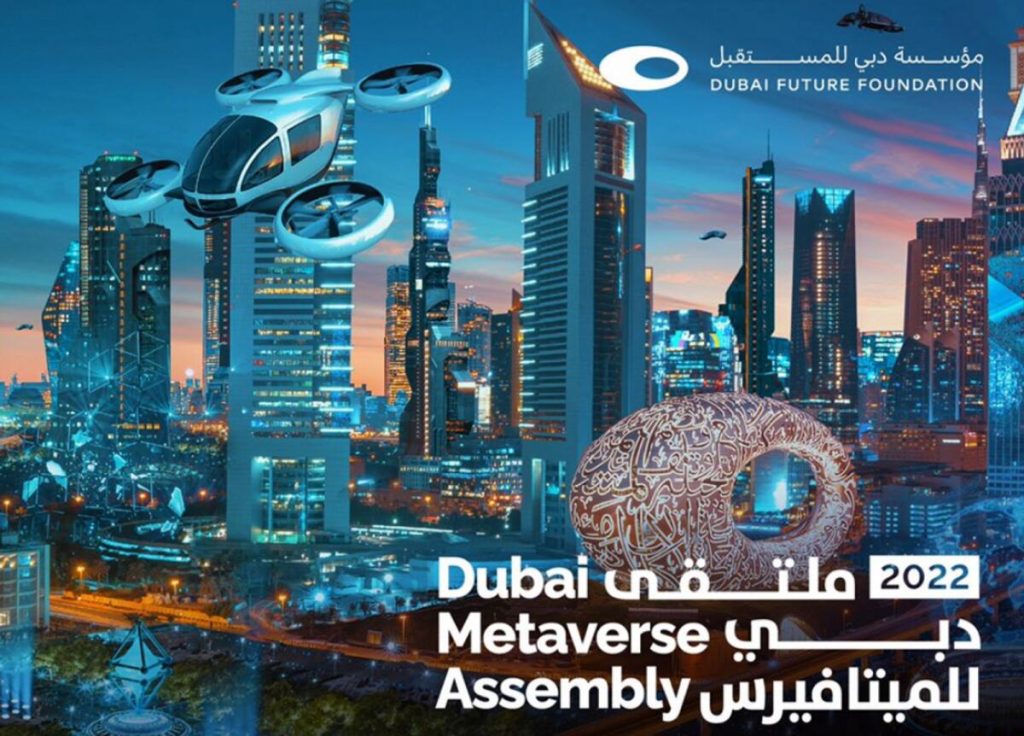
The announcement by the UAE’s Ministry of Economy shortly followed Dubai’s Crown Prince Shiekh Mohammed bin Rashid Al Maktoum announcing the Dubai Metaverse Strategy. As a world first, the comprehensive plan ambitiously aims to add $4 billion a year to the emirate’s economy by 2030, in addition to adding 40,000 virtual jobs. To encourage a digital economy, the UAE also set up the Virtual Assets Regulatory Authority and approved a whole host of laws relating to virtual asserts. This attempt to attract investments and confidence in the UAE’s metaverse project and for cryptocurrencies to increasingly turn to Dubai, was a world first.
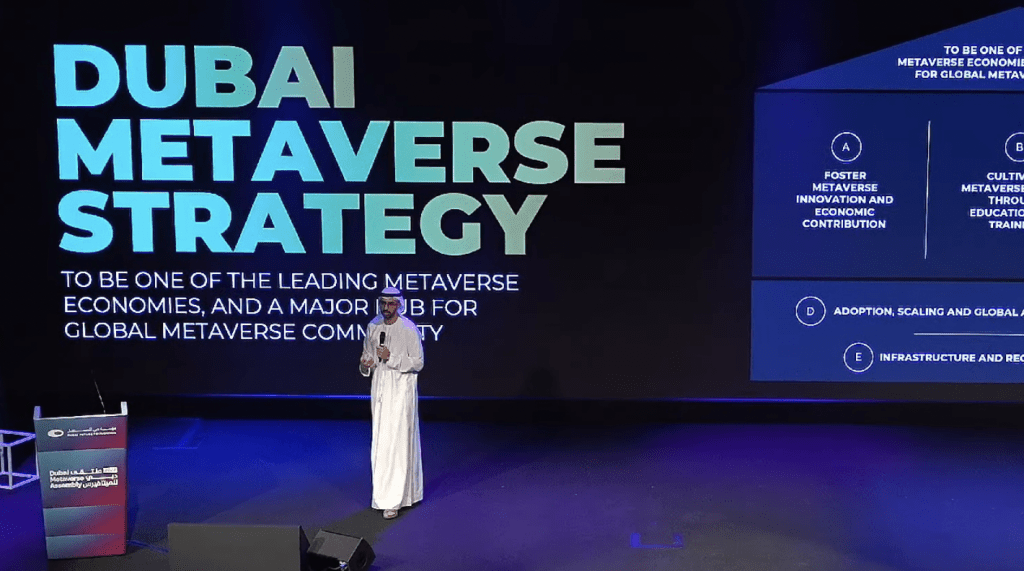
The emirate of Ajman in the UAE experimented with the metaverse in a bid to improve its police services. Several officers from one of the emirate’s police stations were trained on how to use virtual reality goggles and were tasked with meeting residents in the metaverse and responding to their queries. Reported by local officials as being a success, Ajman claims to have plans to expand the program to all police stations across the country and to slowly include other government services. Not addressed, however, was why putting on a pair of VR goggles and logging into the metaverse to get your question answered by a police officer was either better or more convenient than just calling on the telephone.
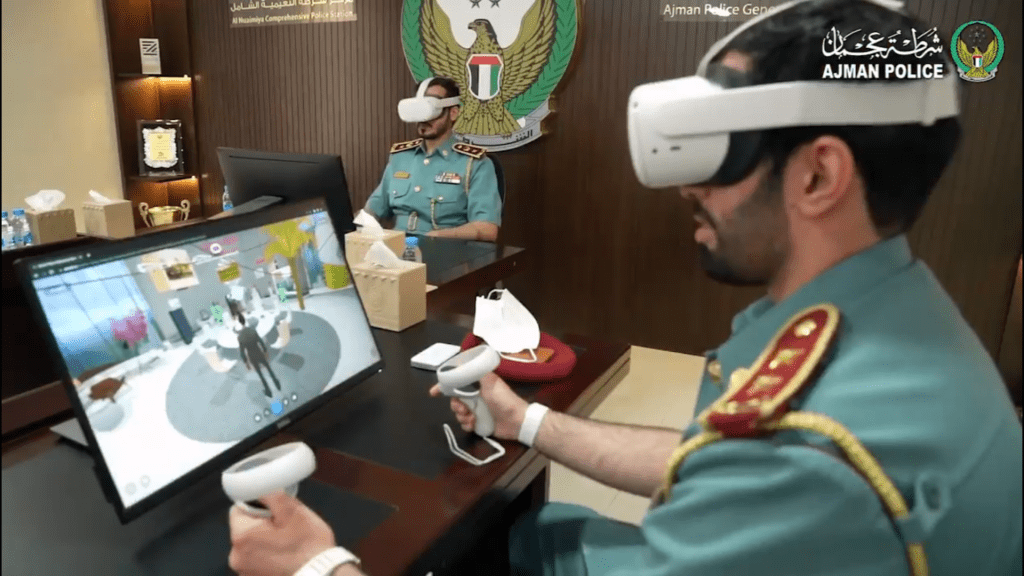
Qatar has similarly been no stranger to efforts to incorporate the metaverse as an important part of its economy. In a world first, Warba Bank became the first bank run on Islamic principles to enter the metaverse. Qatar University similarly followed suit and became the world’s first university to enter the metaverse.
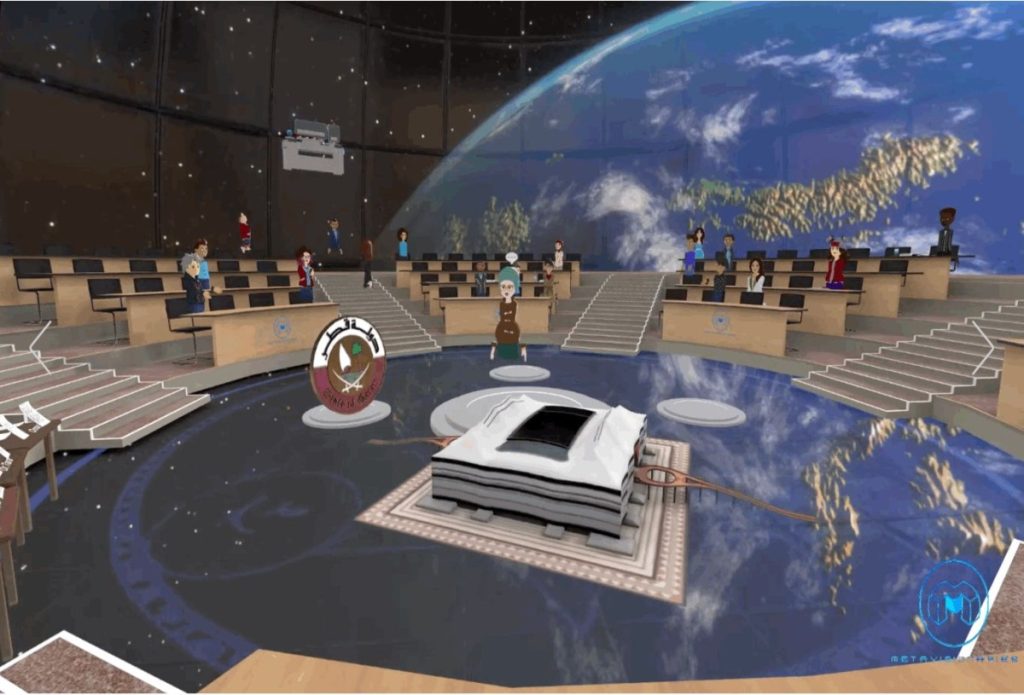
Turning to Saudi Arabia, as part of its economic restructuring plan, $6.4 billion has been set aside for investments into advanced technologies, many of which depend on metaverse and blockchain technologies. NEOM city is set to have a virtual city alongside the physical one, with NEOM Tech & Digital Company having just been given a billion dollars by the central government to launch its own metaverse. Private initiatives have also tried to experiment with the metaverse, with one advertising agency organising celebrations for Saudi National Day virtually on the metaverse.

A Storm Brewing in the Metaverse?
Saudi Arabia, the UAE, and Qatar have ridden the wave of metaverse enthusiasm, undoubtedly driven by predictions by McKinsey & Company that the sector will generate up to $5 trillion by 2030 in an opportunity described by the global management consultancy as “too big for companies to ignore”. However, critics are increasingly arguing that the metaverse, which proponents claim is “too big for companies to ignore”, may instead be too good to be true. Continuing to avoid definition or a clear summary of its benefits and workings, the metaverse has also in its early stages failed to impress upon a large range of users its real use or value. With the undefined future digital economy being such a large part of the development plans of Saudi Arabia, Qatar, and the UAE and such large amounts of money in the region already being invested in the sector, whether the metaverse comes to fruition is of great importance.

NFTs, or non-fungible token, which are proposed as being an important part of the ownership structure in the metaverse, have undergone a significant drop in value. With both the amount of sales going down by 92% and average price of sales for NFTs now a quarter of what they once where, the market is undergoing a drastic dip following the previous hype around the digital assets. Many critics have been pointing to examples of how the massively reduced resell value of NFTs is revealing how NFT valuation was built almost completely on hot air. For example, the listing of an NFT of the world’s first ever tweet, went from a list price of $48 million to only receiving a top bid of around $13,000. Considering the owner originally paid $2.9 million for the NFT, this incredible loss in value raises serious questions as to the viability of the use of NFTs in the metaverse, let alone proposing they form an important part of a nation’s economy, as proposed by Saudi Arabia and the UAE.
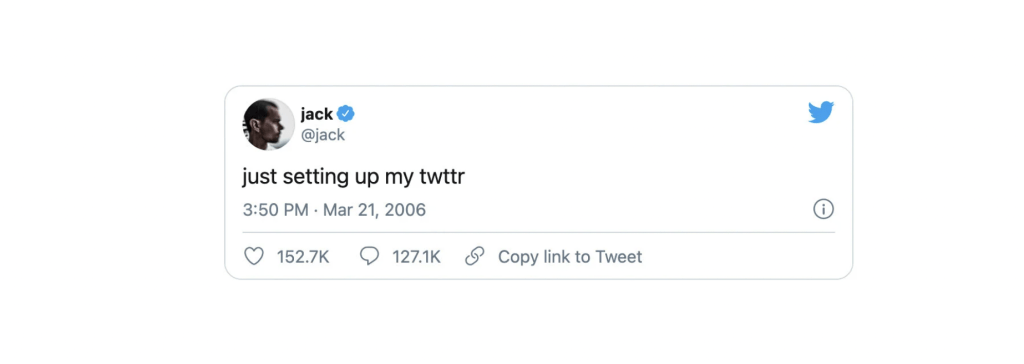
The plunge in NFT prices have been mirrored by a collapse in the metaverse’s real estate market. Bringing to light the question of how the virtual world really relates to the physical world in terms of actual value, virtual mansions brought almost for the same price as actual mansions are now worth a mere 20% of their previous value, according to WeMeta. Considering that the metaverse is presented as an important part of the world’s future economy by its proponents, market volatility and false valuations leaving investors empty handed are the opposite of the type of market confidence that successful economies require.

The virtual world has also unfortunately brought parts of the real world that would be best left behind. In a depressingly common occurrence mentioned by numerous female journalists exploring the metaverse, sexual harassment is rife. With various metaverse platforms enabling hand gestures, groping and lewd gestures have also become part of this new world. Worryingly, reporters have also posed as children on several metaverse platforms and were very quickly subject to grooming attempts by adults. This widely reported phenomenon puts the metaverse’s claim to being an inclusive place into serious doubt and raises serious concern for the safety of women and children. How and if this can be properly policed is a difficult question to answer, and presents serious problems for Saudi’s NEOM project trying to introduce virtual citizenship as an important part of city life for its residents.

Away from the serious economic and social problems plaguing the metaverse, there’s also the question of whether people actually like using the platform. With Meta’s Horizon platform receiving numerous complaints about glitches and how awkward it can make social interactions, the platform has only attracted around 200,000 monthly users. Considering the amount of money invested and promotion of the platform, these low numbers when compared to Meta’s other platforms puts doubt on the feasibility of people and businesses adopting to transition to the metaverse for both work and leisure.

The notion of the metaverse and associated technologies like blockchain and NFTs are undoubtedly coming under increasing scrutiny and going through a turbulent period. However, many explain these as necessary growing pains for a growing technology that has yet to be properly or even understood. While there is an argument to be made that the internet similarly went through a slow, steady, and sometimes tumultuous growing period, and likewise avoided a substantial definition for many years. Whether the metaverse as a concept will emerge along with the development of the technology itself and its real value and uses make themselves apparent over time is still yet to be seen. However, Saudi Arabia, Qatar, and the UAE show no signs of slowing down on their drive to create a new virtual economy and social life based on the metaverse and are continuing full steam ahead.
WE SAID THIS: Don’t Miss… Good News, Pilgrims! Saudi Is Taking Hajj And Umrah To The Metaverse



